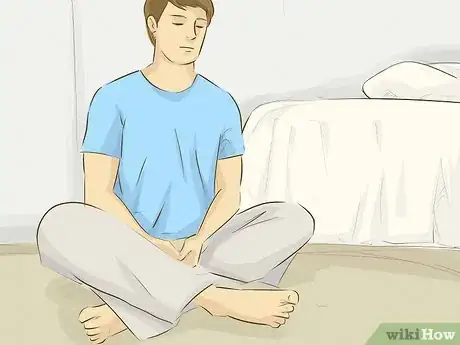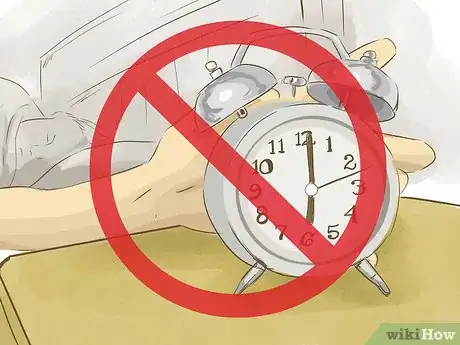This article was co-authored by Jennifer Butler, MSW. Jennifer Butler is a Love & Transformation Coach and the Owner of JennJoyCoaching, a life coaching business based in Miami, Florida, although Jennifer works with clients all over the world. Jennifer’s work centers around empowering women who are navigating any stage of the divorce or breakup process. She has over four years of life coaching experience. She is also the co-host of the Deep Chats Podcast along with Leah Morris and the host of season 2 “Divorce and Other Things You Can Handle” by Worthy. Her work has been featured in ESME, DivorceForce, and Divorced Girl Smiling. She received her Masters of Social Work (MSW) from New York University. She is also a Certified Health Coach, a Communications & Life Mastery Specialist, and a Certified Conscious Uncoupling and Calling in “the One” coach.
There are 13 references cited in this article, which can be found at the bottom of the page.
wikiHow marks an article as reader-approved once it receives enough positive feedback. In this case, 94% of readers who voted found the article helpful, earning it our reader-approved status.
This article has been viewed 200,669 times.
Life provides numerous challenges that complicate our road to happiness. Whether it be job stress, trouble at home, or illness, it can be difficult to remain positive and begin each day with optimism and energy. Yet time and time again, studies reflect that how you begin your day has a significant impact on your productivity and success. Set yourself up for success by learning to begin your day on the right note. You may benefit from consulting these general strategies on how to wake up happily.
Steps
Getting a Good Night's Sleep
-
1Go to bed at a reasonable time. The first step to waking up happy in the morning is getting to bed the night before. Experts say adults should aim for between six to eight hours nightly, so organize your evening activities around getting a full night sleep. Additionally, experts also recommend finishing the use of electronic devices at least an hour before bedtime to give your brain time to shut down and prepare for sleep. This may be difficult if you work odd shifts or have a new baby to care for, but do your best.[1]
-
2Don't sleep with the lights on. Other than making it difficult to attain sleep, research indicates that when we sleep or dream in mild to moderate light, we rest less and wake up feeling less happy than we ordinarily would. This includes sleeping in light generated by TVs, computers, nightlights, and streetlights, which have all have been shown to negatively impact mood of sleepers. [2]
- Try a sleeping mask or blackout curtains to block out light while you sleep.
- Exposure to light interferes with our body's production of melatonin, which is a hormone that helps control your sleep and wake cycle.[3] Dimming your lighting as you're preparing for bed and making your room as dark as possible can help keep your melatonin production on track.[4]
Advertisement -
3Clear your mind with relaxation techniques. Meditation, deep breathing, or progressive muscle relaxation are ways to help calm anxiety, tension, or troublesome thoughts that might keep you awake. Try incorporating one or more of these practices into your nighttime routine.
-
4Sleep on your right side. Want to enjoy peaceful dreams and wake up happy? Researchers have discovered that sleeping on your right side increases the chance that you will have positive dreams and also decreases the likelihood of mood dysfunction throughout the day. Having trouble keeping your sleep position to the right side? Consider purchasing a body pillow. Having it on your left side will shape your sleep posture and prevent you from rolling to the left.[5]
-
5Design your room to be conducive to sleep. Do you live near a busy intersection with lots of noise? Does your bedroom window face the sunrise or street lights? Purchasing light-blocking curtains and getting a white-noise device are only a few of the ways you can create a better environment for deep sleep and happy waking.[6]
- Install a ceiling fan. These can create white noise and also circulate air in a stuffy room.
- Decorate with soothing colors. Repaint if necessary.
- Use ambient lighting, as opposed to overhead lighting, when possible. Lamps are a good source for this, but recessed lighting inside wall molding is also an option. Dimmer switches can also create the right light level.
- Choose the right alarm clock. To ensure waking without shock or grogginess, consider an alarm specially designed to wake you gradually.
- Install an air purifier. For allergy sufferers, this is essential and will result in vastly improved sleep quality.
- Consider a foam mattress. Especially if you sleep with another person, foam mattresses are great at isolating movement so it doesn't wake the other person.
-
6Remember that beds are for sleeping. Research has shown that using your bed for activities like reading or watching movies can prevent sleep and create an association with stimulation rather than rest.[7]
-
7Let go of your worries. If you find yourself having difficulty sleeping due to worries about your day, consider keeping a journal. Earlier in the day, ask yourself "What keeps me awake at night?" and write down the things that are on your mind.[8]
- Keep a notepad by your bed to record intrusive thoughts that wake you up during the night.
- Take stock of accomplishments. One way of helping gain closure and foster reassurance is to write down what you've accomplished during the day.
- Create a to-do list for the next day. Instead of lying awake, trying to remember what needs to happen tomorrow, create a list before going to bed. This helps you get closure on the current day while dialing back on the pressure to remember everything at once.
- Try preparing for the next day before you go to bed. Lay out your clothes, pack a lunch, and assemble everything you'll need for work or school the next morning. This can help ease stress in the morning, and you'll feel better getting into bed know it's already been done.
Waking Up Refreshed
-
1Don't hit the snooze button. When your body wakes up suddenly and goes back to sleep, only to wake up again a few minutes later, it creates a kind of dissonance called "sleep inertia," which makes you feel lazy, groggy, and can persist for up to two hours after waking.[9]
- Select an alarm tone that will ensure that you wake up less grumpy.
- To ensure that you aren't tempted to snag a few more minutes of sleep after the alarm goes off, put your alarm on a shelf or table across the room from your bed, forcing you to get up in order to turn it off.
-
2Take in morning light. Studies have shown that morning light between the hours of six and ten am triggers melatonin release in our brain and has an antidepressant effect, more so than later day or evening light. To ensure you get your daily dose, take a half hour to sit outside in the morning.[10]
-
3Get flowers. Not only are flowers pretty to look at throughout the day, but Harvard psychologist Nancy Etcoff has discovered that women who wake up to the sight of flowers reported substantially improved mood, less anxiety, and more energy throughout the day. A nightstand arrangement of fresh or artificial flowers will brighten up your bedroom and, more importantly, serve as something positive and refreshing to wake up to.
-
4Take a warm shower and finish with a cooling rinse. The thermogenic hypothesis argues that raising core body temperature relaxes muscles, which relieves tension, promoting an increased sense of well-being. Showering in warm water also increases circulation. Psychologists also argue that finishing your shower with a cool, five-minute rinse can duplicate some of the positive antidepressant effects of electroshock therapy, increasing brain function and the release of serotonin.[11]
-
5
-
6Don't rush. While getting a few extra minutes of sleep is tempting, the rush required to make up for it can increase stress, lead to muscle tension, and cause us to be more forgetful than we ordinarily would. All these things have a negative impact on mood and create a negative association related to morning activities. So be sure to wake up early and tackle your morning in a well-paced, thoughtful way.
Creating Happiness
-
1Find the positive. Everyone has a meaningful impact. What is yours? Remember that happiness isn't something that just happens or someplace you just arrive at one day. Happiness is a choice and a practice.[13]
- Think deeply about your day—conversations with friends, favors you've done, actions taken. Think about the outcome of these actions. Do they have positive effects? If not, how could they? Change your behavior when needed so as to confidently bring a positive influence to the lives of others.
-
2Remind yourself of the aspects of your life where you feel the most fulfilled. Are you good at a certain hobby or task? Do you have a good sense of humor and make other people laugh? Are you a fantastic problem-solver? Take the time to remind yourself of what you are good at and why that makes you a worthy person.[14]
- Make a list of the things that make you happy, like silly puppy videos or going on walks, and create habits around them. Commit to doing 3-5 things that bring you happiness every day.[15]
-
3View your work as meaningful. Studies have shown that thinking on a "big-picture" level about your job and its meaning leads to greater overall job satisfaction and increased ability to take pleasure from the work you do.[16]
-
4Find things to look forward to every day. It could be something as simple as a phone call with a loved one or lunch with your coworkers. Finding daily milestones of gratification is an important way to improve overall life satisfaction and put less enjoyable tasks in perspective.
-
5Embrace PMA. PMA is life-coach shorthand for "positive mental attitude," and it is an essential part of creating personal happiness. Having a PMA means being able to believe in good times to come despite challenges in the present. It also means remaining confident that you will surmount challenges as they present themselves. Research has shown that this is not only a means of facilitating good mental and emotional health, but a PMA can actually have a positive influence on physical health as well. Below are seven steps to develop your PMA:[17]
- Focus on the present. The past can remind us of episodes of fear or regret.
- Use positive language. Don't gossip or put other people down. Use praise whenever possible for others and yourself.
- Don't expect perfection. When we make the perfect the enemy of the good, we are never satisfied. Accept when things are not ideal and make them work anyway.
- Interact with positive people. Find friends who share your desire for positivity. Support each other.
- Do good deeds when and where you can. Something as small as paying for a stranger's coffee can make an impact.
- Be a learner. Don't assume you know everything. Always keep an open mind and welcome new experiences and ideas.
- Be thankful. Take stock of the things in your life that matter and bring you joy. Remind yourself of your good fortune.
-
6Build a positive self-image. It is understandably difficult to tackle life's challenges when we feel that we are unworthy and lack the ability to succeed. Therefore, the first step to happiness is learning to love yourself and being able to have a positive perception of your unique qualities.
- Stick to the "1:1 Ratio:" Self-criticism is an important part of self-improvement. That being said, it's easy to tear down yourself esteem if you get too focused on the negative. To combat this tendency, for every negative thought you have about yourself, try to balance it with a positive observation.
- Learn how to love the person who looks back at you from the mirror, stretch marks, cellulite, and everything. The more fiercely you love yourself, the more your internal source of joy will well up within you.[18]
- Give yourself the ability to succeed at something. Everyone looks for tasks that will validate their self-worth, and it is important to provide opportunities for regular success. For example, if you are having a hard week at work, find a hobby or project at home that will let you derive satisfaction from your skills and abilities.
Expert Q&A
-
QuestionHow do you wake up happy in a good mood?
 Jennifer Butler, MSWJennifer Butler is a Love & Transformation Coach and the Owner of JennJoyCoaching, a life coaching business based in Miami, Florida, although Jennifer works with clients all over the world. Jennifer’s work centers around empowering women who are navigating any stage of the divorce or breakup process. She has over four years of life coaching experience. She is also the co-host of the Deep Chats Podcast along with Leah Morris and the host of season 2 “Divorce and Other Things You Can Handle” by Worthy. Her work has been featured in ESME, DivorceForce, and Divorced Girl Smiling. She received her Masters of Social Work (MSW) from New York University. She is also a Certified Health Coach, a Communications & Life Mastery Specialist, and a Certified Conscious Uncoupling and Calling in “the One” coach.
Jennifer Butler, MSWJennifer Butler is a Love & Transformation Coach and the Owner of JennJoyCoaching, a life coaching business based in Miami, Florida, although Jennifer works with clients all over the world. Jennifer’s work centers around empowering women who are navigating any stage of the divorce or breakup process. She has over four years of life coaching experience. She is also the co-host of the Deep Chats Podcast along with Leah Morris and the host of season 2 “Divorce and Other Things You Can Handle” by Worthy. Her work has been featured in ESME, DivorceForce, and Divorced Girl Smiling. She received her Masters of Social Work (MSW) from New York University. She is also a Certified Health Coach, a Communications & Life Mastery Specialist, and a Certified Conscious Uncoupling and Calling in “the One” coach.
Love & Empowerment Coach Happiness is a choice and a practice. Everybody has down periods, but to commit to being happy, try to do 3-5 things that bring you joy every day. This can be everything from talking to a friend who makes you laugh to going on a nice walk around the neighborhood. Then, in the morning you'll have these things to look forward to each day.
Happiness is a choice and a practice. Everybody has down periods, but to commit to being happy, try to do 3-5 things that bring you joy every day. This can be everything from talking to a friend who makes you laugh to going on a nice walk around the neighborhood. Then, in the morning you'll have these things to look forward to each day.
Warnings
- If you are unable to experience joy or positivity over an extended period of time, consider speaking to a doctor or mental health professional. You may be suffering from depression.⧼thumbs_response⧽
References
- ↑ http://www.everydayhealth.com/sleep-pictures/tricks-to-waking-up-in-the-morning.aspx#06
- ↑ http://www.nature.com/mp/journal/v18/n8/full/mp201296a.html
- ↑ http://www.ncbi.nlm.nih.gov/pmc/articles/PMC3047226/
- ↑ http://www.ncbi.nlm.nih.gov/pmc/articles/PMC3047226/
- ↑ https://www.sleepfoundation.org/sleeping-positions/side-sleeping
- ↑ http://www.thisoldhouse.com/toh/photos/0,,20407847,00.html
- ↑ http://psychcentral.com/lib/12-ways-to-shut-off-your-brain-before-bedtime/
- ↑ http://psychcentral.com/lib/12-ways-to-shut-off-your-brain-before-bedtime/
- ↑ http://www.ncbi.nlm.nih.gov/pubmed/10188130
- ↑ http://archpsyc.jamanetwork.com/article.aspx?articleid=204323
- ↑ https://www.psychologytoday.com/blog/inner-source/201407/cold-splash-hydrotherapy-depression-and-anxiety
- ↑ http://www.everydayhealth.com/yoga-pictures/morning-yoga-poses-to-start-your-day.aspx
- ↑ Jennifer Butler, MSW. Love & Empowerment Coach. Expert Interview. 31 July 2020.
- ↑ https://www.sleepfoundation.org/sleeping-positions/side-sleeping
- ↑ Jennifer Butler, MSW. Love & Empowerment Coach. Expert Interview. 31 July 2020.
- ↑ https://www.apa.org/monitor/2013/12/job-satisfaction
- ↑ https://positivepsychology.com/positive-mindset/
- ↑ Jennifer Butler, MSW. Love & Empowerment Coach. Expert Interview. 31 July 2020.
About This Article
If you want to wake up happy every morning, start by making sure that you're getting a good night's sleep. Try going to bed early enough to get 6 to 8 hours of sleep without hitting the snooze button. Once you wake up, take half an hour to sit outside, since studies show that morning light from 6 to 10 a.m. triggers the release of melatonin in our brains. Because rushing can increase stress and forgetfulness, as well as lead to muscle tension, try not to sleep in too late. By waking up earlier, you'll have more time to do things like yoga or stretching, which can help you feel energized and decrease your stress levels. For more advice from our co-author, like how to develop a positive mental attitude, read on!


















































































Medical Disclaimer
The content of this article is not intended to be a substitute for professional medical advice, examination, diagnosis, or treatment. You should always contact your doctor or other qualified healthcare professional before starting, changing, or stopping any kind of health treatment.
Read More...